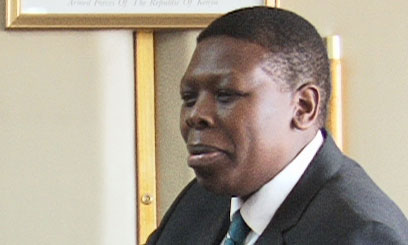
Centre for Multiparty Democracy Chairman Justin Muturi and several political parties argued that this will save the country from constitutional crisis looming over the gende/FILE
Speaking during the opening of a two day workshop, Justice and Constitutional Affairs Minister Eugene Wamalwa said the issue of gender parity has been in existence and that it is the women who have often been disadvantaged and discriminated by various customs and laws.
“It is indeed a paradox that women who are the pillars of our families and by extension the village, the town and indeed our countries should be treated so,” said Wamalwa.
He said although the society is slowly changing its view on the role and place of women in the society with the help of reforms undertaken by the government in various social economic areas, various milestones are still there.
“Granted, a lot more still needs to be done especially with regards to empowerment of women in the political sphere,” the minister said while pointing out that that Constitution has set a threshold for the gender ratios required in all elective and appointive offices.
Article 81(b) of the Constitution provides that: “Not more than two-thirds of the members of elective public bodies shall be of the same gender.” What the Constitution does not provide is the method to be used to ensure implementation.
Article 27 of the Constitution says the State shall take legislative and other measures to implement the principle that not more than two-thirds of the members of elective and appointive bodies shall be of the same gender.
“It is indeed a paradox that women who are the pillars of our families and by extension the village, the town and indeed our countries should be treated so,” said Wamalwa.
Various lobby groups have called on the politicians to reach a compromise on their nomination rules and reserve ‘special seats’ in their strongholds during parties’ nominations to avoid the legal bottle-necks the country may face due to non-compliance with the rule.
Centre for Multiparty Democracy Chairman Justin Muturi and several political parties argued that this will save the country from constitutional crisis looming over the gender rule ahead of elections due next year.
Wamalwa said challenges still exist with regard to implementation of the two-thirds rule especially to elective seats in the legislature.
The Constitutional Affairs Minister said in order to effect the Constitution, the state need to put in place affirmative action programmes and policies to redress the advantages that have been suffered in the past and put in place legislative and other measures to implement the principle.
National Assembly Deputy Speaker Farah Maalim said since independence, Kenya had not considered women in policy and decision-making bodies in the political scene.
“This exclusion of women has largely been due to the fact that Kenya is largely a patriarchal society coupled by the nature of Kenyan politics that has been characterized by extreme violence and hooliganism,” said the deputy speaker.
He urged Kenyan women to come out of their comfort zones and actively participate in the March general election.
“It is only by participating in the electoral process and taking part in the activities of political parties that you will either be elected or nominated by political parties,” said Maalim.
Gender Minister Naomi Shaban called upon vision and wisdom in recognizing the importance of translating into reality the gender equity principle in the constitution.
“It will eventually accelerate growth in Kenya that will have positive impact on the social, economic and political rights practically of women,” she said.
UN Women Regional Programme Director Christine Musisi said she hoped a solution would be found to keep Kenya as a leader in the advancing equitable development in Africa.
The UN body has been in the forefront to educate and encourage women to participate in the elections.
The Bill is expected to come up for debate in Parliament on Wednesday.









































